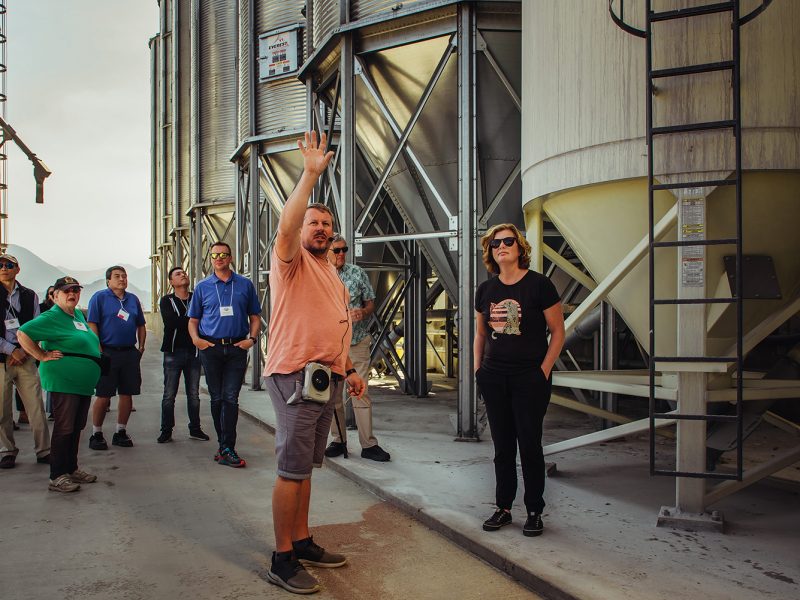CHILLIWACK – A better quality product with fewer workers was the common rationale for the adoption of technology at four agri-food businesses showcased during a recent tour Chilliwack Economic Partners Corp. hosted.
The day-long event September 9 treated more than 50 representatives of government, business and the media to tours of Dutch Heritage Greenhouse, which specializes in cut chrysanthemums; Brooknook Farms, a robotic dairy operation; MolsonCoors, whose Chilliwack brewery uses local water and hops; and Canadian Organic Feeds.
The businesses had made significant investments in their operations over the past three years, and the tour was a chance to show off the latest technology and other innovations.
MolsonCoors, which relocated its brewery to Chilliwack in 2019 from Vancouver, offered the best example of how technology is helping it do more with fewer people.
Just six of the brewery’s 100 workers brew the plant’s annual production of 100 million litres of beer. Based in a control room off the main production floor, the workers monitor signals coming from the stainless steel vats where the malt is soaked, fermented and ultimately pumped into a high-tech “flavour kitchen” for final adjustment before canning.
The majority of workers are employed in the packaging and distribution operations, themselves highly automated production lines that can fill 1,200 cases a minute.
“Everything’s automation in this brewery,” said Wenji Liu, brewery team lead.
Samples undergo regular analysis, verifying that brewing systems are delivering a consistent product. Samples are sent monthly to MolsonCoors’ corporate lab for further testing.
The brewery is situated on land excluded from the Agricultural Land Reserve to accommodate uses related to agriculture and food processing.
However, MolsonCoors also chose the site because of access to clean water and local hops. With the revival of the local hop industry in the mid-2000s, Molson began sourcing hops from the Sartori property in Lindell Beach. Now, it uses hops from several properties in beers distributed coast to coast.
Water, meanwhile, is managed like a precious resource. The brewery has invested $2 million in landscaping that requires minimal water use, among other conservation measures.
“I like to use water for beer, and that’s it,” quipped brewery general manager David Hamel.
High efficiency
Water is also tightly managed at Dutch Heritage Greenhouse, which collects rainwater for use in its state-of-the-art greenhouse completed in 2019. Twice the size of its previous facility, it was built with automation and efficiency in mind. This extends to water use.
“We have a silo that collects rainwater, and also an irrigation ditch outside that collects rainwater. So in this greenhouse, even though we’re constantly irrigating, we actually use less than the annual rainfall,” co-owner Lukas Breugem told the tour.
Water and resource conservation is also in play at Brooknook Farms, where Mark Ricka showcased an expansion completed last year. Purchased in 2015 with a view to making the leap to robotic milking, the dairy keeps close tabs on milk quality. While the DeLaval robots gather information on individual cattle and send alerts to Ricka, the dairy also employs simple strategies such as pre-cooling milk to ensure freshness and save energy in the bulk tank.
During the precooling process, heat transfers from milk to water destined for the hot water boiler, reducing the energy requirement there, too.
The final stop on the tour, Canadian Organic Feeds, showed off its new feed mill built in the former Agropur plant on Yale Road. Purchased in 2017, the former butter and ice cream plant was converted and three-ton silos handling seven feed ingredients were erected.
Overseen by owners Darren and Jen Jansen and three workers, the roller mill can be programmed for a specific grind at a set time. Grains can be milled overnight, for example, so workers can prepare mixes the next morning.
This has made for an efficient operation that distributed to farms as far east as the Kootenays as well as through local businesses including Otter Co-op.
Building on the dairy’s former retail operation, the feed mill has opened an ice cream parlour in response to locals who didn’t want to lose their favourite hangout.
Chilliwack MLA Dan Coulter, representing the provincial government, noted that technology was a common element helping each business adapt, and underscored the BC NDP’s support for agritech promoting as part of its economic strategy.
“Agritech is going to become an ever more important part of agriculture,” he said.


 Plant health centre breaks ground
Plant health centre breaks ground